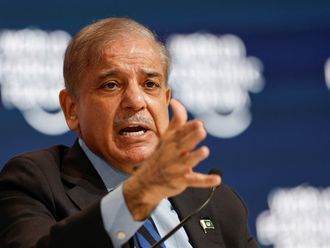Islamabad: Pakistan’s Supreme Court in a landmark majority ruling on Wednesday upheld the establishment of special military courts by the government for speedy trials of those accused in terrorism cases.
A bench comprising all 17 judges of the apex court dismissed by 11-six vote a slew of petitions filed by associations challenging the 21st constitutional amendment passed by the parliament early this year to clear the way for military courts.
Chief Justice Nasirul Mulk and Justice Dost Mohammad announced the verdict, which the court had reserved after concluding the June 26 five-month hearing on the petitions against the 21st amendment to the constitution.
The ruling was criticised by bar leaders, but welcomed in government circles as a positive development for the ongoing fight against terrorism, termed by civil and miltiarry leadership as a “war for survival of Pakistan.”
Prime Ministers’s Special Assistant Irfan Siddiqui said that the verdict is a beacon of light and it will help strengthen the war against terrorism.
He said judiciary’s prestige has been enhanced as a result of the court’s ruling and it will discourage terrorists.
He pointed out that “delaying tactics” cannot be applied in military courts, which he said were put in place after taking all the parliamentary parties into confidence.
Siddiqui said with the endorsement of the two Constitutional Amendments by the Supreme Court, the parliament will be strengthened.
By a 14-three majority vote, the court also rejected petitions against the 18th amendment passed by the parliament during the previous Pakistan People’s Party government, introducing a new procedure for the appointment of superior court judges.
The government of Prime Minister Nawaz Sharif set up the military courts in the wake of a terrorist attack at Army Public School in the northwestern provincial capital, Peshawar, last December, in which 134 children and several teachers were killed.
On April 16, the apex court had suspended executions of six militants who were given death sentences by the special military courts.
The stay order was issued on an application filed by rights activist Asma Jehangir on behalf of the Supreme Court Bar Association after army chief Gen Raheel Sharif had ratified the death sentence to six militants and life imprisonment to one by the military tribunals.
The apex court has revoked the stay order.
Former Supreme Court Bar Association president Kamran Murtaza reportedly described the judicial ruling “disappointing” and said the court just upheld the doctrine of necessity.
“We are going to file a review petition against this judgement,” Murtaza said.
A total of 31 constitutional petitions were taken up by the court, of which 16 petitions were regarding the 18th Amendment the rest were about the 21st amendment.
The judgement on the two constitutional amendments marked the last major verdict under Chief Justice Mulk’s stewardship of the top court as he is due to retire on August 16.












